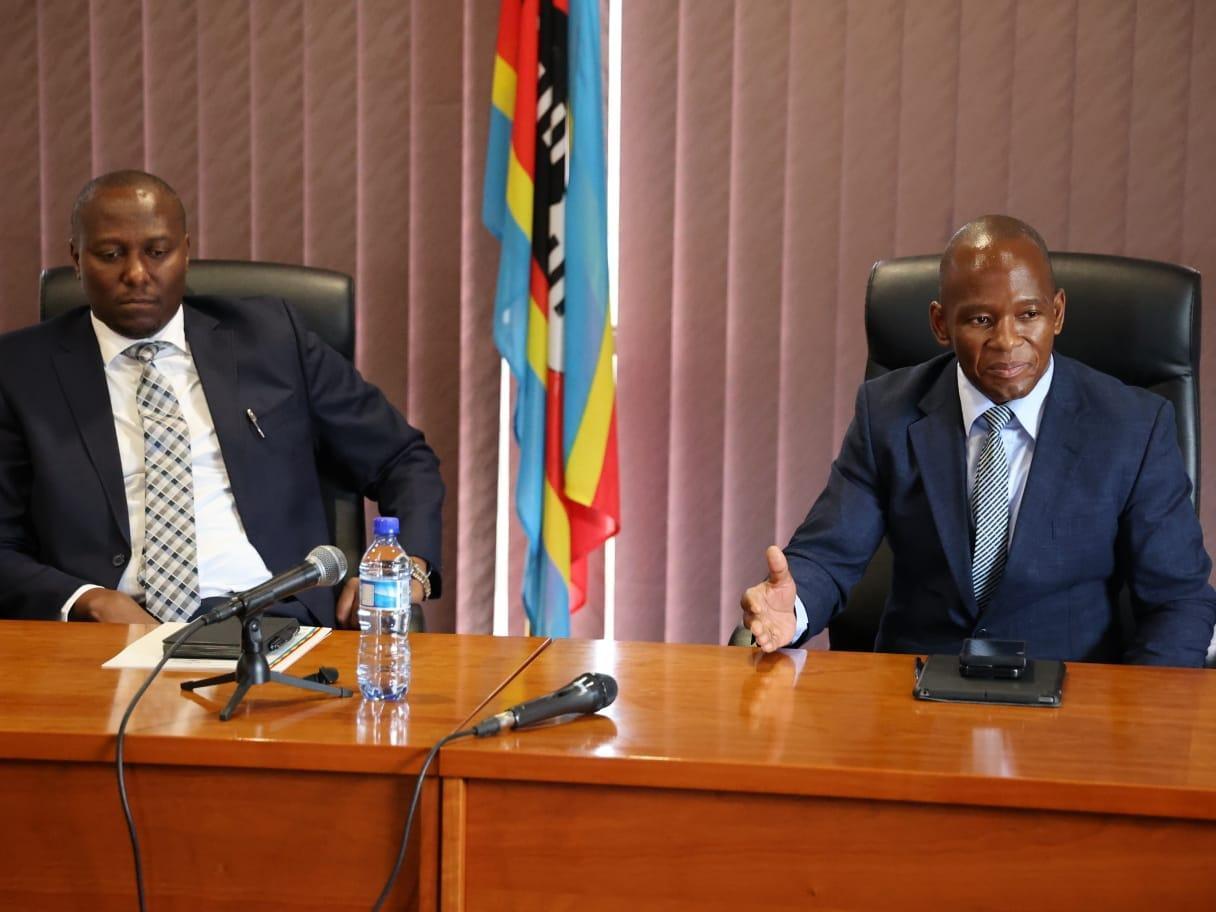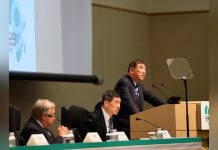Africa-Press – Eswatini. Hardly three days after the strong proclamation by His Majesty King Mswati III for the country to fiercely deal with corruption, the Prime Minister (PM) Russell Dlamini has appointed an anti-corruption task team.
He has strictly ordered them to commence investigations and bring them to finality with immediate effect. Dlamini minced no words when emphasising that no case must be dropped.
The task team, which comprises of Director of Public Prosecutions (DPP) Lomvula Hlophe, the acting National Commissioner of Police Lydia Dlamini and the acting Commissioner of the Anti- Corruption Commission (ACC) Maphevu Mkhatshwa, was tasked to investigate corruption allegations, prosecuting cases, implementing preventive measures, and strengthening legal frameworks to address corruption effectively.
“The team will immediately deal with corruption cases that have been reported and ensure that offenders are brought to book with immediate effect just as it was commanded by the king in His address to Parliament. Cases must be dealt with to finality and not be dropped mid-process. The DPP is expected to prioritise corruption cases henceforth,” Dlamini ordered during a press briefing convened at Cabinet offices yesterday.
In his address during the official opening of Parliament on Friday, the king said law enforcement agencies and structures must work together in the quest for zero tolerance for corruption in Eswatini. The king pointed out that corruption stands in the way of progress in national plans, programmes and projects for development.
“Emaswati have made their voices heard at Sibaya, expressing frustration with the lack of tangible progress in addressing this issue. We strongly encourage government to prioritise taking action on this matter. It is high time we witness judgments passed on individuals involved in corruption, holding them accountable for their actions,” the king ordered.
Dlamini mentioned that the launch of the anti-corruption task team was a positive step towards promoting transparency, accountability, and good governance in line with the policy direction that was clearly articulated in the Speech from the Throne.
“This initiative now reflects the government’s commitment to combating corruption and ensuring the efficient use of public resources for the betterment of society,” said Dlamini.
The premier explained that the task team would report to his office and work with the Minister of Justice and Constitutional Affairs Prince Simelane. He urged the nation to work in tandem with the team as they fight the scourge. Dlamini said government has all the confidence in the team that they would deliver the expected results.
“Corruption is making life worse for the poor. Let us all come together and be the change and stand together in favour of our people and the prosperity of our kingdom and not corruption,” Dlamini emphasised.
When clarity was sought as to whether establishment of the task team effectively meant the ACC would no longer investigate cases on their own, Attorney General Sifiso Khumalo explained that the ACC would continue executing its core duties. He said the task team would assist in fast-tracking the process of ensuring that cases see the light of day. Khumalo recounted that the existence of the anti-corruption task team was not knew. He stated that even during the tenure of the late PM Sibusiso Dlamini there had been such a task team which had the responsibility of overseeing all matters related to the fight against corruption.
“ACC still exists. It has been tasked with the mandate of investigating corruption. However, for smooth operations in the fight against corruption they have to deal with other agencies. When they have completed their investigations, they will hand over cases to the DPP who takes into account whether there is sufficient evidence for prosecution. Police are also part of the process as well. Therefore, the task team has not been appointed to take away powers from the ACC. It will help ensure that state agencies that deal with corruption are well coordinated and work seamlessly,” Khumalo explained.
The PM further emphasised that the ACC was fully operational and would work hand in hand in the fight against corruption.
We look forward to arrest of bobhabuli – PM
The Prime Minister, Russell Dlamini, has disclosed that he looks forward to arrest of corrupt big-wigs, commonly referred to as bobhabuli.
“We look forward to bobhabuli kutsi babanjwe lihhuka baye ebhodweni,” said Dlamini. This can be loosely translated to mean “we look forward to corrupt big-wigs being brought to book and face the law”. The PM said corruption was a worldwide problem that had become endemic in the kingdom of Eswatini. He pointed out that it significantly negatively impacts democracy and the rule of law. “When power is utilised for personal gain, the political system loses credibility and justice cannot prevail. Corruption undermines our progress as a nation and impacts negatively on service delivery, human and socio-economic development, job creation and public trust in government, as well as investor confidence and the objectives and goals of the new government given to us at Sibaya and waters down investment,” said Dlamini. He continued to state that “government has committed itself to having zero tolerance for and fighting corruption in all sectors of society. Some of the causes of corruption are first and foremost greed for money, poverty, lack of values and ethics, high level of bureaucracy and inefficient administrative structures, which must also be dealt with concurrently.”
Report all forms of corruption now, justice minister urges
Minister of Justice and Constitutional Affairs Prince Simelane has urged members of the public to bring forward reports of any corrupt activity without fail to the anti-corruption task team.
The minister applauded Prime Minister Russell Dlamini for appointing the anti-corruption task team hardly three days after the directive by His Majesty King Mswati III during the official opening of Parliament on Friday. The king spoke strongly about the need to ensure that the scourge of corruption gets fought expediently by all stakeholders. Prince Simelane said it was impressive that the PM found it prudent to make meaningful efforts towards making a strong statement in the fight against corruption on his first day at the office after the king’s speech.
“I felt teary as the king explained the scourge of corruption in Eswatini when delivering the Speech from the Throne. However, my tears have been wiped today by the strong declaration by the PM that any form of corruption will not be tolerated in the kingdom. Following the absence of an acting commissioner at ACC, I am happy to state that we have Maphevu Mkhatshwa holding the reins. It is in this spirit that I hereby call upon members of the public to report any form of corruption with the ACC,” said the prince. The five-year contract of the Commissioner of the ACC, Daniel Dlamini, came to an end on October 16, 2023. As per Section 11 of the Prevention of Corruption Act of 2006, it is the commissioner who may authorise in writing any officer of the commission to conduct an inquiry or investigation into alleged or suspected offences under this Act. The lapse of the contract came at a time when the ACC was being called upon to investigate corruption cases which were viewed to be on the rise. However, Prince Simelane stood up to the occasion after being appointed into office and appointed Mkhatshwa following the outcry. The PM also encouraged members of the public to provide any evidence or allegations of corruption either before the anti-corruption task team or Anti- Corruption Commission.
CJ judgment never stopped ACC’s job – AG
Attorney General Sifiso Khumalo has clarified that government strongly holds the view that the judgment by Chief Justice Bheki Maphalala did not stop the Anti-Corruption Commission from executing its core mandate – fighting corruption.
This view was expressed by Khumalo when responding to a question on whether there were any concerns from government to the effect that ACC was rendered ‘toothless’ following the pronouncement by Maphalala when handing down a judgment in the matter between former minister of commerce, industry and trade Gideon Dlamini and the ACC.
The CJ made obiter dicta statements, which were not binding but persuasive, when he delivered the judgment to the effect that certain sections of the Prevention of Corruption Act, 2006 were unconstitutional. This was in 2015. He dismissed an application that had been filed by the ACC to have the former minister arrested, together with Nigerian businessman Fred Ngeri and his wife Sindile, for alleged corruption-related offences.
Khumalo, speaking during the appointment of an anti-corruption task team by Prime Minister Russell Dlamini yesterday, said they were fully aware that the matter was pending before court after the DPP filed an appeal.
The matter was due to be heard by a full bench of the High Court, which comprised of Judge Mumcy Dlamini, who was sitting together with Judge Nkosinathi Maseko and Judge Justice Mavuso last week. However, it was postponed to March 6, due to various reasons, which included locating and serving Ngeri with court papers, among others.
“We have always held the view that the CJ when making pronouncements in the ruling did so obiter dicta, which means it was in passing. It was not a legal principle. However, even though it was viewed as probably persuasive in court and could be used by someone else before court resulting in a legal principle that could be binding,” Khumalo explained.
He went on to state that with regards to the “decision of the CJ as it were, we have always held the view that it was not binding. Therefore, it does not stop the ACC from executing its duties. From where we sit, there is nothing stopping the ACC from executing its duty in the judgment. I am certain that even the CJ probably holds the same view that from a legal point of view, there is nothing stopping that ACC from doing its job. We still maintain that it was said obiter dicta which meant it was said in passing and therefore not binding.”
During the recent Sibaya, corruption was one of the topical as various speakers took turns to brandish the ACC as a ‘toothless’ institution.
In the first three days of submissions and panellists presentations, over 25 speakers raised the issue of corruption and its effects.
For More News And Analysis About Eswatini Follow Africa-Press







